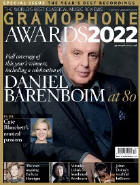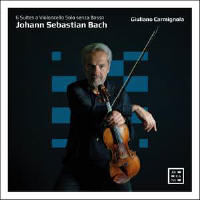Texte paru dans: / Appeared in: |
|
|
Outil de traduction |
|
|
Bach’s Cello Suites, or movements from them, have luxuriated in versions for harpsichordists, gambists, guitarists, viola players and latterly for violinists, with Rachel Podger’s complete violin version being Giuliano Carmignola’s nearest rival on disc. Put simply, the altered sound world entails an upward shift of a fifth, where, as Carmignola points out in his booklet interview, ‘transposition was necessary in order to recreate the same technical-musical structure as the original’. The one exception is the Fifth Suite, where Bach calls for scordatura (altered tuning) and where transcriber Marco Serino in turn prepared two versions, one without scordatura and one with, which Carmignola prefers, largely because of the brighter sound frame that it offers him.
Reviewing Podger’s set, Peter Quantrill remarked that she ‘treads lightly on the Courante of No 2 where cellists dig deep, but she takes care to preserve the ungainly chords of the same suite’s Minuet’. Turn then to Carmignola’s stately reading of the latter and although the texture remains bright, the sense of abrasive confrontation levels with the gutsy manner of any cellist. In the Courante Carmignola is again fullon, Podger gentler and marginally more flexible, a trend that registers again and again when comparing the two sets. But there’s far more to it than that. For the Fifth Suite’s Sarabande Carmignola is a weeping mourner at some unnamed memorial, or so it seems, a sorrowfully apposite impression within the confines of lockdown and the Ukraine tragedy. As a listener you don’t need to take that stand, of course, and yet the sense of aloneness is quite unlike Podger’s sensitive rendition, which although responsive to the notes lacks Carmignola’s palpable feeling of an underlying narrative. (As additional evidence, compare the timings: Podger at 2'29", Carmignola 4'15".)
Contrasts again abound in the Sixth Suite, which is in D major no matter which way you turn, violin or cello. Carmignola’s long-breathed account of the Allemande, with well-aimed ornaments and expressively distended phrasing, is extraordinarily beautiful. His audible pressing on the instrument’s fingerboard almost enhances the sense of tension, whereas the Suite’s motoric Prelude has a rhythmic pungency, almost Bruegel-like in its invitation to dance or sway (what unalloyed joy this man conveys through his playing!) that suggests a gospel preacher in full flow. Which brings me to a point that may cause some to shake their heads in this fundamentally secular age. By his own admission, Carmignola is a religious man: ‘I have the faith of simple, humble people, as my maternal grandmother and my parents were’, if I may once again quote his booklet interview. Even more significantly, Bach himself also had ‘simple faith’. Would any of his great masterpieces have been conceivable without the founding stone of spiritual awe, whether denominationally sanctioned or not? Speaking personally, I doubt it. Carmignola’s playing conjures a combination of prayerful meditation and earthy dancing, basic Bachian credentials that these masterpieces thrive on, no matter who’s playing them or on what instrument. Carmignola would unquestionably be my recommended choice for a violin version of the Suites. |
|




